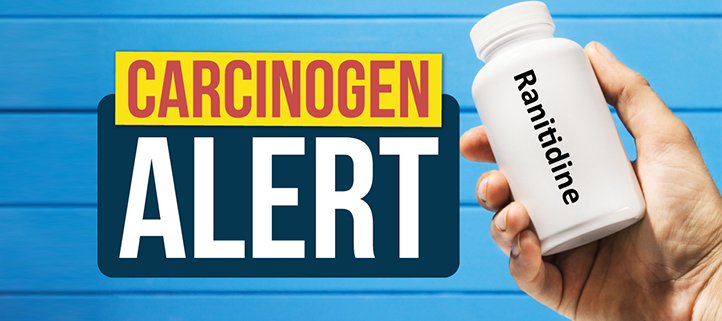
The News:
On September 13th, the USFDA uncovered that certain Ranitidine products contain NDMA (N-NitrosoDimethylamine) which is a cancer-causing impurity. Post this revelation, the USFDA issued a precautionary alert to healthcare practitioners and patients to keep a check on the intake of ranitidine drugs available as OTC as well as prescription medicines in the market.
The recent breakthrough on the subject shared by the FDA informed that the testing method used by a third-party laboratory was applying higher temperatures. This method generated very high levels of NDMA from ranitidine products, henceforth, the FDA has laid down a testing protocol that involves the LC-HRMS testing method. The LC-HRMS testing method does not use high temperatures and has detected much lower levels of NDMA in ranitidine.
The breakthrough evoked a debate on the last update which stated that it’s “early, limited testing” has detected unacceptable levels of NDMA in ranitidine samples and therefore, the consumption of ranitidine is no more a low-risk concern. This news altered the stand taken by the Drug Controller General of India (DCGI) where it had asked to not withdraw Ranitidine from the markets, however, initiated a precautionary alert to ensure patient safety by requesting the physicians to closely monitor the complaints and reports of any side effects, if found. DCGI had also asked the state drug controllers and manufacturers to evaluate and if necessary, to collect the samples of medications from wholesalers and retailers for the precise testing of these products.
The Maharashtra State Directorate of Health Services (DHS) has already issued a circular to all government hospitals to ban the antacid Ranitidine with immediate effect. The hospitals have been ordered to segregate and pull the product off shelves until the next orders. It is expected that other states will follow suit.
The Issue with Ranitidine:
As revealed by USFDA, Ranitidine products contain NDMA which is classified as a potential human carcinogen. NDMA is an environmental contaminant that is found in food, water, meat, dairy, etc. OTC Ranitidine tablets of 75 and 150 mg were lab tested, which are primarily indicated for relieving heartburns, unsettled stomach, and acid indigestion. The action was taken when Valisure (an online pharmacy) filed a petition requesting the USFDA to recall all products with Ranitidine content. Valisure found high levels of NDMA in Ranitidine in their lab test which was primarily conducted on Ranitidine drugs under the brand name Zantac.
Following the alert, the USFDA also asked drug companies to provide test data on the Ranitidine ingredients. The recall letter alert issued by USFDA led to an immediate halt in the production of Ranitidine products across the globe. Patients who consume Ranitidine tablets as per their prescriptions were asked to consult their doctors for Ranitidine substitutes
Impact on Indian Pharma Companies:
The global Ranitidine formulation market is estimated at INR 20,000 crores while according to the data obtained by AIOCD PharmaTrac, the market size in India is estimated at INR 688.6 crores. The Indian Health Ministry has alerted all states and union territories to authenticate Ranitidine-containing formulations for the presence of NDMA.
The key Ranitidine manufacturers in India are JB Chemicals, Cadila Pharma, Dr. Reddy’s, Zydus Cadila, Sun Pharmaceuticals, GSK Pharma, Torrent Pharma, Novartis, and Strides Pharma.
On Sept 26th, British Pharma company GlaxoSmithKline voluntarily recalled Ranitidine medicines from India. “As a precautionary action, GSK has decided to initiate a voluntary recall (pharmacy/retail level recall) of Zinetac Tablets 150 mg and 300 mg products manufactured in India using API sourced from Saraca Laboratories Ltd,” a GSK spokesperson said in a statement issued to Economic Times.
As the world’s leading regulatory authorities are testing the drug to investigate the probable carcinogen, Dr. Reddy’s, Strides Pharma, and Novartis have already instigated a recall of Ranitidine products worldwide. Cadila and JB chemicals claim that the presence of NDMA in their ranitidine products is within the permissible level, hence, they continue to sell it in the Indian market. Adhering to the FDA’s recent protocol, other companies are also testing their products to examine the level of NDMA. Indian API companies such as Sarca Laboratories and Solara-Active have temporarily discontinued the production and distribution of Ranitidine ingredients. This has been assumed to result in an estimated 5 % downfall in Solara Active’s revenue as Ranitidine Hydrochloride was one of the top 10 APIs of the company.
To read the recent update on the ranitidine issue click here
Sources: FDA.gov, Fierce Pharma, Economic Times, Times of India
